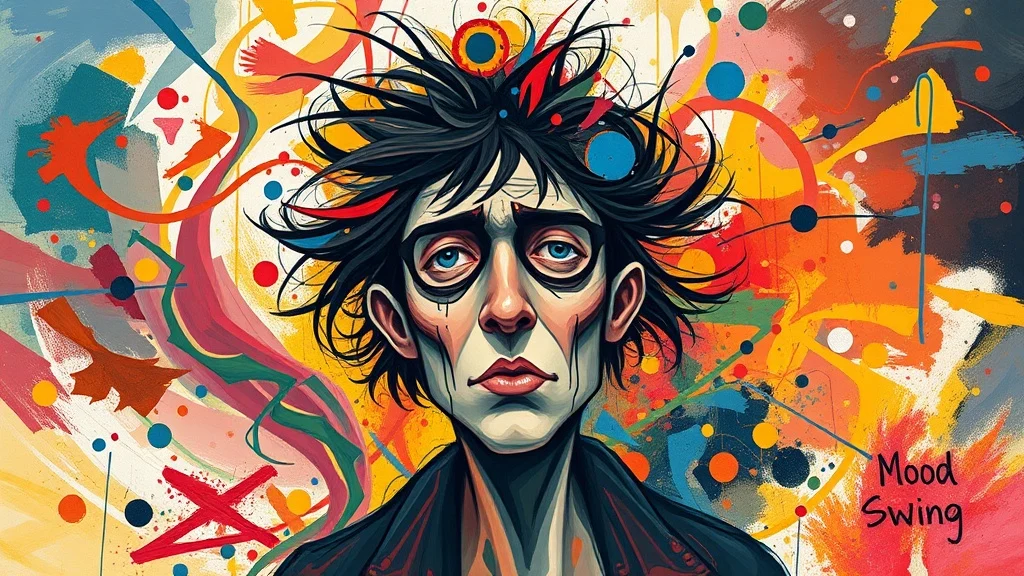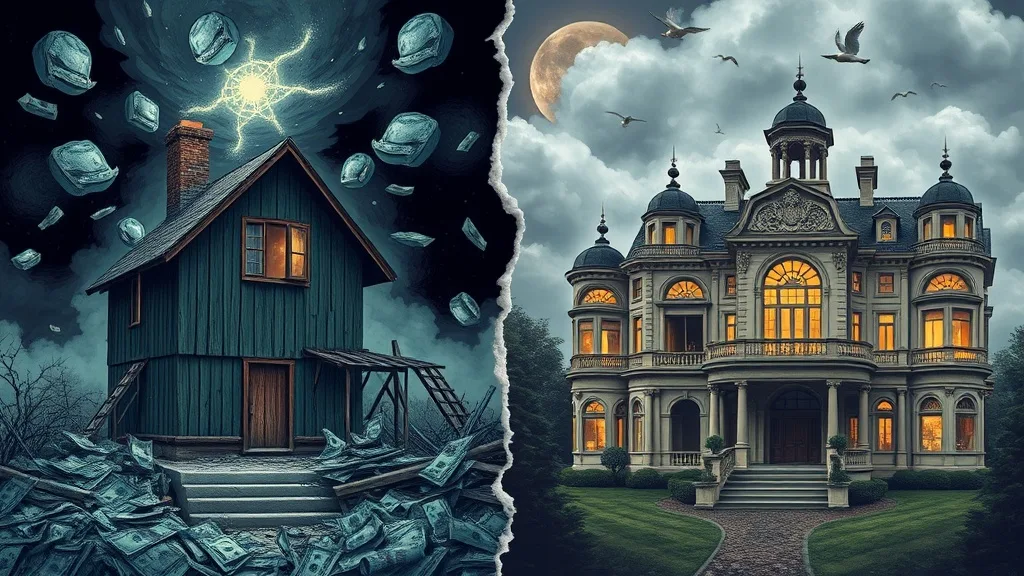Dream Symbols for Bipolar Disorder: Unlocking the Meaning Behind Dreams
Want a Personalized Dream Interpretation?
Curious about what your dreams mean? Discover personalized interpretations beyond dream symbols. Get insights tailored to you!
Get Free Interpretation Now →Table of Contents
Do you experience frequent mood swings, from feeling euphoric to depressed and back again? If so, you may have bipolar disorder. But did you know that this condition can also be reflected in your dreams?

Dreams have long been thought to provide a window into our subconscious minds, revealing our deepest fears and desires. And for people with bipolar disorder, dreams can offer insights into their unique experiences of the world.
Whether it's flying high on a manic episode or feeling lost in a depressive state, dreams can capture the essence of bipolar disorder in a way that words sometimes cannot. But what are the specific dream symbols that might indicate this condition?
In this article, we'll delve into the world of dream symbolism for bipolar disorder. We'll explore common themes, images, and objects that might appear in your dreams and help you understand their significance.
What Do Dreams about Bipolar Disorder Reveal?
Racing Thoughts or Lack of Concentration
When you dream of racing thoughts - it alludes to an inability to focus your attention and energy. If you've been struggling to concentrate, this dream is a sign that you need to slow down and take a break.
On the other hand, if you dream of a lack of concentration - it signifies a feeling of being overwhelmed and unable to focus. This dream is a sign that you need to take some time for yourself to relax and recharge.
Erratic Behavior
Dreams featuring unpredictable or erratic behavior, whether from yourself or others, can symbolize the tumultuous swings of bipolar disorder. This could manifest as sudden shifts in mood, energy levels, or behavior. The dreamer may experience periods of intense excitement and grandiosity followed by periods of profound depression and hopelessness. These erratic patterns in dreams can reflect the challenges of living with bipolar disorder, as individuals struggle to maintain stability and predictability in their lives.
Sleep Disturbances
Bipolar disorder is often characterized by sleep disturbances, which can manifest in dreams as well. People with bipolar disorder may experience vivid, erratic, and intense dreams during manic episodes. These dreams often reflect the person's heightened mood and racing thoughts, and may involve grandiose ideas, unrealistic goals, or excessive self-confidence. Conversely, during depressive episodes, dreams may become more frequent and include themes of sadness, despair, and worthlessness. The severity and nature of sleep disturbances in dreams can provide valuable clues to the presence and stage of bipolar disorder.
Impulsive Spending
Impulsive spending is a common symptom of bipolar disorder, a mental illness characterized by extreme mood swings. In dreams, impulsive spending can symbolize the loss of control experienced by individuals with this condition.

During manic or hypomanic episodes, individuals may engage in excessive spending sprees, often without regard for financial consequences. This reckless behavior can be a manifestation of the intense feelings of euphoria and grandiosity associated with these episodes.
In dreams, uncontrolled spending can reflect the internal turmoil and instability experienced by individuals with bipolar disorder. The act of spending out of control can represent an attempt to fill an emotional void or to distract from underlying feelings of anxiety or depression. Additionally, it can symbolize the loss of autonomy and the inability to regulate one's own behavior, which are often associated with bipolar disorder.
Substance Abuse
Dream Symbol: Bipolar Disorder
Substance Abuse
In dreams, substance abuse often signifies a deep-seated emotional imbalance or instability. Just as addiction alters brain chemistry, affecting mood and behavior, dreams involving substance use may represent a search for self-medication.
The substances themselves can carry symbolic meanings. Alcohol, for instance, may symbolize a desire to escape or numb emotional pain. Drugs, on the other hand, can represent a craving for intense experiences or a need to alter reality.
Repeated dreams of substance abuse could suggest a subconscious recognition of an underlying mental health issue, particularly bipolar disorder. The mood swings associated with bipolar disorder can mimic the highs and lows of substance use, leading to self-destructive behaviors in an attempt to regulate emotions.
Dreams of substance abuse in this context serve as a warning, urging individuals to seek professional help to address their emotional turmoil and underlying mental health conditions.
Self-Harm or Suicidal Thoughts
These dreams often reflect extreme distress and emotional turbulence, symbolizing the inner turmoil experienced by individuals with bipolar disorder. The act of self-harm in dreams may represent a desperate attempt to regulate intense emotions or express feelings of worthlessness and self-loathing. Suicidal thoughts in dreams signal a profound sense of hopelessness and a desire to escape unbearable pain. These dreams should be taken seriously as they indicate a need for immediate professional help and support.
Grandiosity or Inflated Ego
Dreams of excessive grandeur or an inflated ego can symbolize episodes of mania or hypomania associated with bipolar disorder. These dreams may feature exaggerated feelings of self-importance, power, or invincibility. The dreamer may experience delusions of grandeur or inflated self-esteem, believing they are superior to others or capable of achieving extraordinary feats. Such dreams reflect the excessive confidence and unrealistic beliefs that often accompany manic episodes.
Hallucinations or Delusions
Hallucinations or delusions in dreams may symbolize a disconnect from reality. They could represent an inability to distinguish between what is real and what is perceived, reflecting a symptom of bipolar disorder. The content of the hallucinations or delusions may provide insights into the individual's underlying thoughts, emotions, and beliefs, potentially indicating shifts in mood or episodes.
Loss of Identity
If you dream of experiencing a loss of identity in any way, it may be symbolic of bipolar disorder. Here, the self that you see being lost in your dream is not literally you, but rather a part of yourself that you’ve lost touch with. This could be a part of yourself that you’ve neglected or suppressed due to the challenges of living with bipolar.
Difficulty Maintaining Relationships
When someone with bipolar disorder dreams of struggling to maintain relationships, it symbolizes the challenges they face in forming and sustaining stable interpersonal connections. The dream may reflect their difficulty in regulating their emotions and behavior, which can lead to misunderstandings, conflicts, and relationship breakdowns. Additionally, it may indicate a fear of abandonment or rejection, which can hinder their ability to fully commit to and trust others. The dream serves as a reminder of the importance of seeking support and understanding from loved ones or professionals who can help them manage their condition and improve their relationship skills.
Biblical Meanings of Dream Symbols: Bipolar Disorder
Cultural and Historical Perspective of Dream Symbolism in Bipolar Disorder
Throughout history, dreams have been a source of fascination and intrigue, particularly in the context of mental health. In the case of bipolar disorder, dream symbolism has played a significant role in understanding the condition.
During the early days of psychiatry, dreams were seen as a window into the unconscious mind, and their interpretation was believed to provide insight into the underlying causes of mental illness. In the 18th century, Dr. George Cheyne proposed that dreams could be used to diagnose and treat mental disorders, including mania and melancholy (the historical terms for bipolar disorder).
In the 19th century, the advent of psychoanalysis further emphasized the importance of dreams in understanding the psyche. Sigmund Freud believed that dreams were the "royal road to the unconscious" and could reveal repressed thoughts, desires, and conflicts. This perspective laid the foundation for interpreting dream symbolism in bipolar disorder, with researchers exploring the themes and motifs that emerged in the dreams of those with the condition.
As the understanding of bipolar disorder evolved, so too did the interpretation of its dream symbolism. In the mid-20th century, researchers began to draw connections between the phases of bipolar disorder and the content of dreams. During manic episodes, dreams tended to be characterized by themes of grandeur, euphoria, and increased energy. In contrast, dreams during depressive episodes often reflected feelings of sadness, hopelessness, and worthlessness.
Today, dream analysis remains a valuable tool for clinicians working with individuals with bipolar disorder. By exploring the symbolism and themes present in their dreams, therapists can gain a deeper understanding of their patients' inner experiences, identify potential triggers, and develop tailored treatment strategies.
10 Enigmatic Dream Symbols That May Hint at Bipolar Disorder
1. Dream of Mood Swings
Mood swings are a common symptom of bipolar disorder, and they can be a source of great distress for people who experience them. Dreaming of mood swings can be a way for the subconscious mind to process these emotions and experiences.

The dream may involve sudden shifts in mood, from extreme happiness to deep sadness. The dreamer may feel like they are on an emotional roller coaster, with no control over their feelings. The dream may also involve feelings of anxiety, depression, or irritability.
Dreams of mood swings can be a sign that the dreamer is struggling to manage their emotions. They may be feeling overwhelmed by their symptoms, or they may be trying to suppress them. The dream can be a way for the subconscious mind to express these feelings and to help the dreamer to process them.
If you dream of mood swings, it is important to talk to your doctor. They can help you to understand your symptoms and develop coping mechanisms. They may also recommend medication or therapy to help you manage your condition.
2. Dream of Mania
In a dream of mania, the dreamer experiences heightened excitement, energy, and euphoria. This can manifest in the dream through:
- Grandiose plans: The dreamer may have ambitious ideas and plans, feeling unstoppable and capable of achieving anything.
- Elevated speech: The dreamer may speak rapidly and excitedly, often with grandiose gestures.
- Increased physical activity: The dreamer may be restless, pacing, running, or dancing excessively.
- Irresponsibility: The dreamer may make impulsive decisions or engage in risky behaviors without regard for consequences.
- Hallucinations or delusions: In extreme cases, the dreamer may experience sensory hallucinations or grandiose delusions of power or invincibility.
These dream symbols reflect the heightened state of mind and grandiose self-perception associated with mania in bipolar disorder. The dreamer may feel invincible and euphoric, but it's essential to be aware that these symptoms can also indicate an underlying mental health condition that requires professional attention.
3. Dream of Hypomania
If you dream you are hypomanic in your dream, it suggests that you are feeling creative and motivated.
You are likely to have many new ideas and be able to execute them quickly. This is a good time to start new projects and take risks. However, it is important to be aware of the potential dangers of hypomania, such as impulsivity and irritability. If you start to feel out of control, it is important to seek help.
5 Demographics of Individuals Prone to Dreams Associated with Bipolar Disorder
1. Age and Gender
Dreams can reflect our innermost thoughts, feelings, and experiences, and this is especially true for those with bipolar disorder. The symbols in our dreams can provide valuable insights into our mental health and well-being.
Age
- Younger individuals: Dreams of intense emotions, rapid mood swings, and reckless behavior.
- Older adults: Dreams of memory loss, difficulty concentrating, and feelings of worthlessness.
Gender
- Women: Dreams of mood swings, irritability, and racing thoughts.
- Men: Dreams of aggression, impulsivity, and grandiosity.
Understanding the unique dream symbols associated with bipolar disorder can help individuals and their loved ones recognize early warning signs, track mood cycles, and improve overall coping mechanisms. By paying attention to the imagery and emotions present in dreams, we can foster greater self-awareness and a deeper understanding of the complex nature of bipolar disorder.
2. Occupation and Education
-
High-Pressure Occupations:
- People working in high-stress environments (e.g., surgeons, lawyers) may experience vivid dreams characterized by frantic activity, deadlines, and a sense of urgency, reflecting the intensity of their waking lives.
-
Creative Professions:
- Artists, musicians, and writers often report imaginative dreams filled with symbols of inspiration, creativity, and emotional highs. These dreams may provide a space for their subconscious to explore and express their passions.
-
Educators:
- Teachers and professors may dream about classrooms, students, and educational materials. These dreams can be a reflection of their workload, responsibilities, and the impact they strive to make on others.
-
Unemployed Individuals:
- People who are unemployed may experience dreams about job hunting, financial stress, and feelings of inadequacy. These dreams can mirror their concerns and anxieties about their current situation.
-
Highly Educated Individuals:
- People with higher education levels tend to have more complex dream narratives and recall their dreams with greater detail. They may engage in lucid dreaming, where they can control and manipulate their dream experiences.
3. Socioeconomic Status
The socioeconomic status of individuals with bipolar disorder can significantly influence their dream symbolism. Those from lower socioeconomic backgrounds may experience dreams that reflect their struggles with poverty, insecurity, and lack of opportunity.

These dreams often revolve around themes of material scarcity, financial instability, and the fear of losing what little they have. Individuals may dream of being homeless, living in dilapidated housing, or unable to afford basic necessities. Such dreams can manifest as nightmares, evoking feelings of anxiety, desperation, and hopelessness.
Conversely, individuals from higher socioeconomic backgrounds may have dreams that reflect their experiences with privilege, stability, and success. They may dream of luxurious homes, fancy cars, and successful careers. These dreams can be pleasant and provide a sense of security and comfort. However, they may also come with a sense of pressure and responsibility to maintain their status.
Self-Reflection through Dream Symbolism in Bipolar Disorder
Dreams are a window into your subconscious mind, offering valuable insights into your thoughts, emotions, and experiences. For individuals with bipolar disorder, dream symbols can provide a unique opportunity for self-reflection and understanding.
Keeping a dream journal is a powerful tool for recording and analyzing your dreams. By jotting down your dreams as soon as you wake up, you can capture the emotions and imagery that often fade throughout the day. Dream Decoder, an AI dream interpreter, can assist you in unraveling the meanings hidden within your dreams, providing you with personalized interpretations based on your unique experiences.
Through self-reflection on your dream symbols, you can:
- Identify triggers: Notice patterns in your dreams that may be linked to triggers for your mood episodes.
- Understand your emotions: Explore the underlying emotions and conflicts that are expressed through your dreams.
- Gain insights into your symptoms: Find connections between your dream imagery and specific symptoms of bipolar disorder.
- Empower yourself: By understanding your dreams, you gain a greater sense of control and empowerment over your condition.
Self-reflection on dream symbolism can be a transformative journey, helping you gain a deeper understanding of yourself and promoting a more balanced and fulfilling life.

